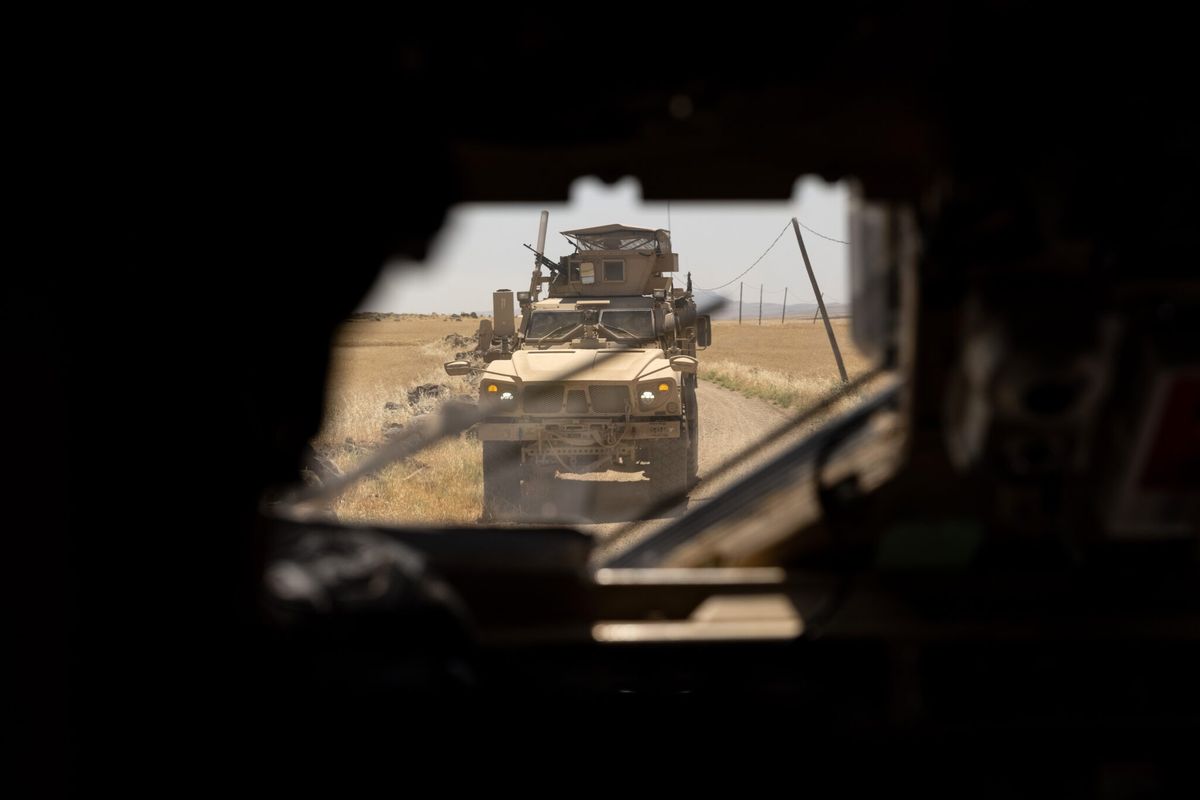It is now almost six years since the Syrian Revolution began, and to this day, the concept of an “ideal” end state remains vague and out of reach. Will Syria become a democracy or will it remain a dictatorship? Will the country remain technically united but suffer from conflict between warring militias, or will it divide into smaller, autonomous regions along ethno-sectarian lines?
These questions are being asked for two reasons. First, the modern state – the regime of Bashar al Assad – has failed. The Syrian people felt forsaken by this dictatorship and its claims of secular prosperity so they revolted against it. However, because Syrians do not have a historical precedent or memory of a state before French colonial occupation, there is no clear idea or system to shape what will happen after the war ends.
Second, the Syrian opposition, with it's incapability to provide a coherent program for replacing the regime and its institutions, has no clear cultural or practical revolutionary agenda to deconstruct the religious ideas that lead to fundamentalism or regain the trust of the people in the concept of a modern state. Even though they have Western support, moderate opposition actors are not really capable of effecting actual change or shaping the future state. Instead of trying to recreate a Syrian identity that could form the basis of this state, they are lost in the short-term political process of promoting their own version of “the Syrian cause.”
These points help us to understand Syria today and, more importantly, what it means to be Syrian: what is missing and what is being added by Syrians in exile, and the factors that have created what could be called the "ideal victim" narrative, which stigmatizes Syrians in a way that induces sympathy.
They also help us to understand the ways that a new life in refugee host countries has reshaped Syrians’ awareness of themselves and helped create a new Syrian identity, one defined by troubled relationships with host countries, life in camps, and the fact they no longer have a real life experience in Syria.
The “Ideal Victim”
For the past six years, the media has shown Syrians as a product of the failure of humanity, where Syrians gain their value as humans by how much their stories are being circulated in media, rather than the real life effect of the war. They are part of a victimization process that is being put forth by the media. This “victim narrative” manifests in two key ways.
First, we see images of Syrians crossing borders, seas, and drowning, which present refugees as a unified group of similarly distressed people who are waiting to reach the West, the land of freedom and well-being.
The second manifestation of this victim narrative is the “Syrian Survivor,” which we see in less prominent media reports about refugees who passed the International Baccalaureate tests, or did something else special, as if being a refugee and these modern Western achievements are mutually exclusive.
The victimizing aspect of this is that the appeal of these accomplishments doesn't come from their inherent value as people. Instead, they derive their legitimacy from the word "refugee." Rather than being just an administrative status, this word is becoming a sort of tool to gain sympathy and added political value, which makes it even more difficult to define what is truly Syrian.
Indetermination
The idea of indetermination comes from literary criticism, and it describes the points of emptiness in a narrative, which readers have the chance to fill with their own experiences. In the Syrian narrative we see that Syrians, especially those who are growing up in camps or live outside Syria, have a huge problem relating to the country itself.
Their experience with Syria is limited so, for them, it's just a set of fictional stories from their parents and the media. I say fictional because, after a while, memory naturally adds fiction in order to make experiences and events more "logical." For this reason, accounts describing how Syria was, and how it will be, cannot always be trusted.
Eventually, this will lead us to a new generation of Syrians, who didn't witness Syria but adapt a narrative that speaks to their "group" of Syrians – one that can never speak to all Syrians.
The example of Palmyra prison and the brutality that the regime exercised there perfectly underlines this point. Media stories, folk tales, and literature have given us – the generation that didn't actually witness this brutality – stories of what occurred there, such as the novel “The Shell” by Mustafa Khalifa. But, once the prison was bombed by both the Syrian regime and Islamic State in Iraq and Syria (ISIS), the generations to come are left only with past knowledge of what went on there.
We have no reference now about the prison, no solid images or facts. All we have are stories. Literature, novels, and folk tales that build small fragments of fact – documents and prisoner testimonies – into fictional works that try to explain the horrors of this prison. This is in direct contrast to places like Auschwitz in Germany, where the terrors of the concentration camp are vividly recorded in images, prison records, testimonials, and the evidence of the physical structure itself.
Thus, Palmyra prison and its destruction is a metaphorical example of how fiction has begun to play a role in constructing the future Syria, while simultaneously de-constructing its past in the absence of valid documentation.
Integration: the Grand Colonialist Narrative
Finally, one of the main issues related to refugees and their status in host countries is the concept of integration, which is flawed in two key ways.
First is inequality. The colonialist narrative of enlightened Europe tries to integrate refugees into society as if this narrative is supreme. It's not only a way of helping new arrivals to adapt into the bureaucracy and institutions of the host state, which is logical, but it also sets two distinct value systems, one that is "right" and another which is "wrong."
In part, this comes from a racist and colonialist point of view, which regards refugees as exotic creatures who need to be civilized, instead of considering them as people who come from different historical experiences, with their own values and worldview.
The second, and more dangerous, flaw comes from "refugees" themselves and their refusal to acknowledge the host country’s value system. Based on my personal experience, some Syrian refugees refuse the values of the "infidel" state and deny being part of it, because those values try to make them forget where they come from.
What is dangerous about this, is that it raises questions about the meaning of revolution in Syria and how it has actually changed the mentality of the Syrian people. Syrians should now be able to question old beliefs and create some kind of distance from the past in order to build a modern and free Syria that goes beyond the duality of regime/revolution as standards to judge and categorize people and thoughts. This will allow people to accept some of what the host country offers them.
An Alternative Narrative
What Syria needs now is an alternative body of culture – by culture I refer to the wider meaning of text, values, and images – in order to build a future Syria.
We need to create a body of thought that future generations can relate to; a coherent narrative that recognizes Syria as it is, instead of building a fictional "meta-Syria,",which is romantic, victimized, and based on the denial of reality.
Most of all, we need to construct an honest narrative that represents all Syrians and their differences, one that Syrians now and in the future can relate to in order to regain their shattered identity. This will present a positive alternative to the images and texts of today, which only represent violence, loss, and values that are determined either by a relationship with the regime, the revolution, or violent fundamentalism.












